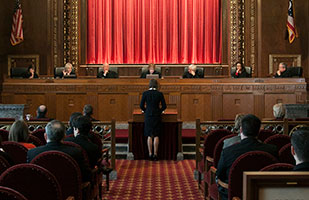Cleveland Murderer’s Death Penalty Appeal Reaches Supreme Court

Besides Anthony Sowell’s case, the Court will review appeals involving medical malpractice, sentences for crimes committed decades ago, and juvenile credit for time served.

Besides Anthony Sowell’s case, the Court will review appeals involving medical malpractice, sentences for crimes committed decades ago, and juvenile credit for time served.
The Ohio Supreme Court will hear arguments in the death penalty appeal of Anthony Sowell on April 5. Sowell, who was convicted of the murders of 11 women between 2007 and 2009 in Cleveland, has raised multiple issues with his trial, convictions, and death sentence. Police discovered the women’s bodies in and around his home in 2009.
Police searched Sowell’s house after Latundra Billups reported he had raped her. During the search, police found the bodies of five women and the skull of another inside the house, and unearthed the five other women’s remains from the backyard.
A jury convicted Sowell in 2011 on 81 counts, including the aggravated murders of the 11 women and the attempted murders of three women, along with felonious assault, rape, and kidnapping. The trial court imposed the death penalty.
Sowell Lays Out Fair Trial Concerns, Contests Legal Strategy
In Sowell v. State, Sowell argues the trial court should have moved the case to another location given the extensive media coverage of the murders. The possibility of juror bias was high in this case because of negative pretrial publicity, making a fair trial in the county improbable, he contends.
He also challenges the trial court ruling that prevented his attorneys from asking potential jurors their thoughts about specific mitigating factors during jury selection, and he thinks his lawyers were obligated to have invested more effort in the mitigation, rather than the guilt, phase of the trial.
Were Public Trial Rights Violated?
In September 2014, the Supreme Court also ordered Sowell and the state to submit written arguments about whether his constitutional right to a public trial was deprived when the trial court closed the courtroom for a pretrial suppression hearing and again during the questioning of potential jurors.
The suppression hearing was held to decide whether the details of Sowell’s 11-plus hour interrogation by police could be heard during the trial. In Sowell’s view, the trial court didn’t consider alternatives to a closed hearing and didn’t meet the legal standard for banning public and media access to the proceeding. The state, however, contends the court’s decision protected Sowell’s right to a fair trial. Also, the state maintains, the court limited the closure to the review of only the interrogation and had no other options available to ensure a fair hearing.
On the voir dire issue, the parties explain that potential jurors were questioned individually. The court closed the courtroom during this process. The state argues Sowell asked for a “sequestered,” or closed, session for jury selection, as evidenced by his requests to possibly question the jurors one by one in the judge’s chambers. Sowell maintains he never sought to exclude the public and media from the courtroom. The closed courtroom denied his right to a public trial, and his conviction and sentence should be overturned, he concludes.
Oral Arguments
In its one-day session on Tuesday, April 5, the Court will consider Sowell and three other appeals, also from Cuyahoga County. Arguments will begin at 9 a.m. at the Thomas J. Moyer Ohio Judicial Center in Columbus and will be streamed live online at sc.ohio.gov and broadcast live on The Ohio Channel.
Previews Available
Along with the brief descriptions below, the Office of Public Information today released previews of the four cases.
Case Highlights
- A man filed a medical malpractice lawsuit against the Cleveland Clinic in state court after a failed robotic prostatectomy left him impotent and incontinent. He initially filed the suit within the required statute of limitations, but voluntarily withdrew it and filed suit in federal court. The federal court dismissed it, and the man refiled in common pleas court nearly six years after the surgery. In Cleveland Clinic v. Antoon, the clinic argues the man missed the filing deadline and the state’s four-year “statute of repose” applies to refiled malpractice cases. This case presents the first time since Ohio’s sweeping 2003 tort reform law that the Court will consider how the statute applies when a patient discovers an injury during the four-year time limit, but refiles after four years.
- Following DNA testing of a rape kit 10 years ago, the Cleveland man in State v. Thomas was sentenced in March 2014 for a 1993 rape and kidnapping. When imposing his prison term of 11 to 28 years, the court used the laws in effect when he committed the crimes. The Cuyahoga County prosecutor asserts that the sentence is correct and that later 2011 amendments to the punishments for these crimes, which likely would result in less prison time for the man, shouldn’t apply. The statutes at the time of the offenses are the proper sentencing laws to use in this case, the prosecutor argues.
- A minor charged with aggravated robbery spent 286 days in jail awaiting the resolution of his case. In a plea agreement, the state dropped the criminal charges and filed a new complaint in the juvenile court in which the minor admitted to lesser offenses. The juvenile court, however, refused to give him credit for the time he had already served. In the appeal, In re D.S., both the minor and the state agree that the relevant statute requires courts to subtract the time a minor has been held from the child’s commitment for an offense.


